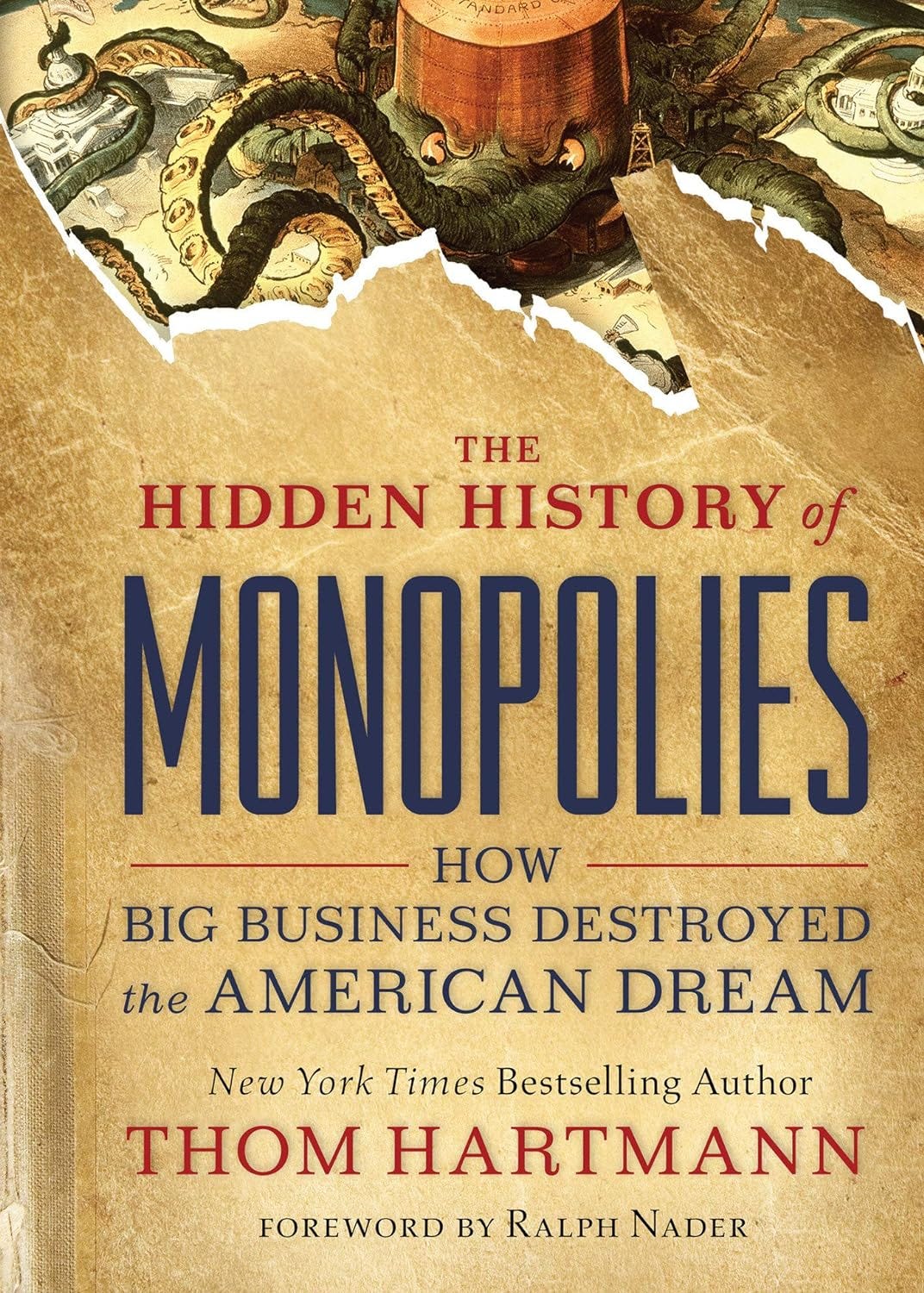Part One: America Was Founded on Resistance to Monopoly
The Hidden History of Monopolies: How Big Business Destroyed the American Dream

PART ONE: America Was Founded on Resistance to Monopoly
America was birthed in a fight against monopoly.
There’s a pervasive myth in America—promoted by wealthy anti-tax activists—that the Revolutionary War was fought because colonists didn’t want to pay taxes to England. While that sentiment was certainly widespread, the spark that lit the fuse of the Revolution was monopoly and a giant tax cut for the world’s largest corporation, not an increase in taxes.
By 1773, Great Britain had a stranglehold on the economy of the colonies, enforced through the British East India Company, which held monopoly rights to much of the commerce with North America.1
The Company, whose stock was heavily held by the Brit- ish royal family and senior government officials, successfully lobbied Parliament for a variety of restrictions on commercial activity in the colonies, including a ban on the manufacture of most high-end products, such as clothing, and an absolute monopoly on the wholesaling of tea to the colonies.
Up and down the East Coast, small tea shops and tea importers reacted with rage to the Tea Act of 1773, which gave the East India Company a massive tax break, eliminating all tax on their tea sold into the colonies, and expanded their monopoly on the tea business. Small importers, who’d been buying in the London markets or from Dutch trading companies to sell to tea-houses from Boston to Washington, DC, found themselves undercut by the tax-free Company tea.
The citizens of Boston and surrounding areas covered their faces, massed in the streets, and destroyed the property of a giant global corporation. Declaring an end to global trade run by the East India Company that was destroying local economies, this small minority started a revolution with an act of rebellion later called the Boston Tea Party.
In a rare-book store around 2000, I came upon a first edi- tion of A Retrospect of the Boston Tea-Party, With a Memoir of George R. T. Hewes, a Survivor of the Little Band of Patriots Who Drowned the Tea in Boston Harbour in 1773. Because the identities of the Boston Tea Party participants had been hidden (other than Samuel Adams), and all were sworn to secrecy for the next 50 years, this is the only existing first- person account of the event by a participant.
Hewes’s description suggests that the Boston Tea Party resembled today’s growing protests against corporate monopolies, as well as the efforts of small towns to protect themselves from chain-store retailers, frackers, toxic waste sites, coal-fired power plants, and factory farms.
Although schoolchildren are usually taught that the Amer- ican Revolution was a rebellion against “taxation without representation,” akin to modern-day conservative taxpayer revolts, in fact what led to the Revolution was rage against a transnational corporation that, by the 1760s, dominated trade from China to India to the Caribbean and controlled nearly all commerce to and from North America, with subsidies and special dispensation from the British crown.
Hewes wrote, “The [East India] Company received per- mission to transport tea, free of all duty, from Great Britain to America,” allowing it to wipe out New England–based tea wholesalers and mom-and-pop stores and take over the tea business in all of America.
Hence, it was no longer the small vessels of private merchants, who went to vend tea for their own account in the ports of the colonies, but, on the contrary, ships of an enormous burthen, that transported immense quantities of this commodity. . . . The colonies were now arrived at the decisive moment when they must cast the dye, and determine their course.2
Hewes, dressed as an Indian, disguised his face with coal dust and joined crowds of other men in silently hacking apart the chests of tea and throwing them into the harbor. In all, the 342 chests of tea—over 90,000 pounds—thrown overboard that night were enough to make 24 million cups of tea and were valued by the East India Company at 9,659 pounds ster- ling, or, in today’s currency, just over $1 million.
In response, the British Parliament immediately passed the Boston Port Act, stating that the port of Boston would be closed until the citizens of Boston reimbursed the East India Company for the tea they had destroyed. The colonists refused.
A year and a half later, the colonists again defied the East India Company and Great Britain by taking on British troops in an armed conflict at Lexington and Concord (the “shots heard ’round the world”) on April 19, 1775.
That war—triggered by a transnational corporation and its government patrons trying to deny American colonists a fair and competitive local marketplace—ended with independence for the colonies.
The revolutionaries had put the East India Company in its place with the Boston Tea Party, and that, they thought, was the end of that.
Unfortunately, the Boston Tea Party was not the end; 150 years later, during the so-called Gilded Age, powerful rail, steel, and oil interests rose up to begin a new form of political system to benefit the wealthy and their corporations. America’s economic royalists captured the newly formed Republican Party in the 1880s and have been working to establish a permanent wealthy and ruling class in this country ever since.


